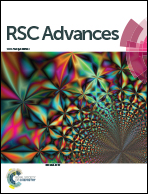Nano-topographic titanium modulates macrophage response in vitro and in an implant-associated rat infection model†
Abstract
The macrophage-implant response plays a pivotal role in the interactions between implants and tissue involving inflammation and tissue remodeling. In this study, we investigated the proliferation, migration, and inflammatory cytokine secretion of macrophages adhering to titania nanotubes (TNT) and polished titanium (pTi) surfaces in a lipopolysaccharide (LPS)-simulated infection environment. An infection model in rats was used to analyze cell and bacterium responses to TNT and pTi implants in vivo. The in vitro results indicated that TNT surfaces restricted macrophage proliferation and migration and reduced pro-inflammatory cytokine secretion. Notably, LPS loading onto the TNT surface resulted in macrophage elongation with increased levels of secreted pro-inflammatory cytokines within 24 h followed by a decrease to the lowest level of all tested samples at 72 h. Analogously, increased amounts of inflammatory cytokines were observed for the TNT implants in vivo at 24 h with fewer detected at 72 h compared with pTi in the presence of Staphylococcus epidermidis (Se). Additionally, TNT implants exhibited lower total amounts of viable bacteria at 72 h than pTi implants. Furthermore, the tissues exhibited preferential spreading on TNT-Se implants at 72 h. These results suggested that the TNT surface in an infection environment could regulate the inflammatory response and promote tissue remodeling more effectively within the initial implantation compared with pTi. This study indicated the ability to construct functional nano-topographic surfaces by loading proteins or cytokines on implant surfaces that then could effectively modulate macrophages to support a healing process in lieu of chronic inflammation.


 Please wait while we load your content...
Please wait while we load your content...